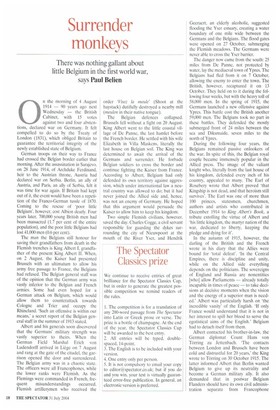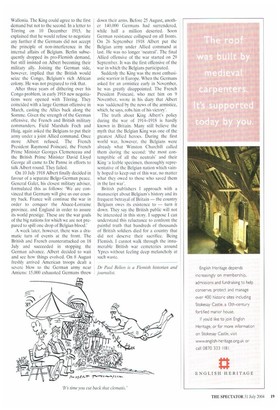Surrender monkeys
There was nothing gallant about little Belgium in the first world war, says Paul Belien
0 n the morning of 4 August 1914 — 90 years ago next Wednesday — the British Cabinet, with 15 votes against two and four abstentions, declared war on Germany. It felt compelled to do so by the Treaty of London (1831), which obliged Britain to guarantee the territorial integrity of the newly established state of Belgium.
German troops on their way to France had crossed the Belgian border earlier that morning. After the assassination in Sarajevo, on 28 June 1914, of Archduke Ferdinand, heir to the Austrian throne, Austria had declared war on Serbia. Berlin, an ally of Austria, and Paris, an ally of Serbia, felt it was time for war again. If Britain had kept out of it, the event would have been a repetition of the Franco-German tussle of 1870. Coming to the rescue of 'poor little Belgium', however, cost Albion dearly. Four years later, 700,000 young British men had been massacred (1.7 per cent of the entire population), and the poor little Belgians had lost 41,000 men (0.6 per cent).
The man the Belgians still honour for saving their grandfathers from death in the Flemish trenches is King Albert I, grandfather of the present King Albert II. When, on 2 August, the Kaiser had presented Brussels with an ultimatum to allow his army free passage to France, the Belgians had refused. The Belgian general staff was of the opinion that the German army was vastly inferior to the Belgian and French armies. Some had even hoped for a German attack on Belgium, which would allow them to counterattack towards Cologne and Trier and occupy the Rhineland. 'Such an offensive is within our means,' a secret report of the Belgian general staff in the summer of 1913 stated.
Albert and his generals soon discovered that the Germans' military strength was vastly superior to theirs. When the German Field Marshal Erich von Ludendorff arrived in Liege on 7 August and rang at the gate of the citadel, the garrison opened the door and surrendered. The Belgian army was in a chaotic state. The officers were all Francophones, while the lower ranks were Flemish. As the Flemings were commanded in French, fre quent misunderstandings occurred. Flemish artillerymen who received the order Wisez la meule' (Shoot at the haystack) dutifully destroyed a nearby mill (meulen in their native tongue).
The Belgian defences collapsed. Brussels fell without a fight on 20 August. King Albert went to the little coastal village of De Panne, the last hamlet before the French border. He settled with his wife Elizabeth in Villa Maskens, literally the last house on Belgian soil. The King was determined to await the arrival of the Germans and surrender. He forbade Belgian soldiers to cross the border and continue fighting the Kaiser from France. According to Albert, Belgium had only defended its own territory against aggression, which under international law a neutral country was allowed to do; but it had never joined the Allied side and, hence, was not an enemy of Germany. He hoped that this argument would persuade the Kaiser to allow him to keep his kingdom.
Two simple Flemish civilians, however, saved the day. Charles Cogge, a civil servant responsible for guarding the dykes surrounding the city of Nieuwpoort at the mouth of the River Yser, and Hendrik Geeraert, an elderly alcoholic, suggested flooding the Yser estuary, creating a water boundary of one mile wide between the Germans and the Belgians. The flood gates were opened on 27 October, submerging the Flemish meadows. The Germans were never able to cross the Yser barrier.
The danger now came from the south: 25 miles from De Panne, not protected by water, lay the mediaeval town of Ypres. The Belgians had fled from it on 7 October, allowing the enemy to enter the town. The British, however, recaptured it on 13 October. They held on to it during the following four weeks, but with the heavy toll of 58,000 men. In the spring of 1915, the Germans launched a new offensive against Ypres. This battle cost the British another 59,000 men. The Belgians took no part in these battles. They defended the mostly submerged front of 24 miles between the sea and Diksnauide, seven miles to the north of Ypres.
During the following four years, the Belgians remained passive onlookers of the war, In spite of this, the Belgian royal couple became immensely popular in the Allied press. The image of the valiant knight who, literally from the last house of his kingdom, defended every inch of his country, appealed to many. The Earl of Rosebery wrote that Albert proved 'that Kingship is not dead, and that heroism still survives'. The Earl was one of more than 100 princes, statesmen, churchmen, authors and artists who contributed in December 1914 to King Albert's Book, a tribute extolling the virtue of Albert and 'his little kingdom, the martyr nation of the war, dedicated to liberty, keeping the pledge and dying for it'.
In the autumn of 1915, however, the darling of the British and the French wrote in his diary that the Allies were bound for 'total defeat'. 'In the Central Empires, there is discipline and unity, while on the Allied side everything depends on the politicians. The sovereigns of England and Russia are nonentities [who] allow Parliaments — already totally incapable in times of peace — to take decisions at decisive moments when the vision and the energy of a superior man is needed,' Albert was particularly harsh on 'the incredible vanity' of the English. 'If only France would understand that it is not in her interest to spill her blood to serve the egotistical aims of the English.' Belgium had to detach itself from them.
Albert contacted his brother-in-law, the German diplomat Count Hans von Torring zu Jettenbach. 'The contacts between London and Brussels have been cold and distrustful for 20 years,' the King wrote to Torring on 30 October 1915. The latter informed Albert that Berlin wanted Belgium to give up its neutrality and become a German military ally. It also demanded that in postwar Belgium Flanders should have its own civil administration separate from Francophone Wallonia. The King could agree to the first demand but not to the second. In a letter to Torring on 10 December 1915, he explained that he would refuse to negotiate any further if the Germans did not accept the principle of non-interference in the internal affairs of Belgium. Berlin subsequently dropped its pro-Flemish demand, but still insisted on Albert becoming their military ally. Joining the German side, however, implied that the British would seize the Congo, Belgium's rich African colony. He was not prepared to risk that.
After three years of dithering over his Congo problem, in early 1918 new negotiations were opened with TOrring. They coincided with a large German offensive in March, casting the Allies back along the Somme. Given the strength of the German offensive, the French and British military commanders, Field Marshals Foch and Haig, again asked the Belgians to put their army under a joint Allied command. Once more Albert refused. The French President Raymond Poincare, the French Prime Minister Georges Clemenceau and the British Prime Minister David Lloyd George all came to De Panne in efforts to talk Albert round. They failed.
On 10 July 1918 Albert finally decided in favour of a separate Belgo-German peace. General Galet, his closest military adviser, formulated this as follows: 'We are convinced that Germany will give us our country back. France will continue the war in order to conquer the Alsace-Lorraine province, and England in order to assure its world prestige. These are the war goals of the big nations for which we are not prepared to spill one drop of Belgian blood.'
A week later, however, there was a dramatic turn of events at the front. The British and French counterattacked on 18 July and succeeded in stopping the German advance. Albert decided to wait and see how things evolved. On 8 August freshly arrived American troops dealt a severe blow to the German army near Amiens: 15,000 exhausted Germans threw down their arms. Before 25 August, another 140,000 Germans had surrendered, while half a million deserted. Soon German resistance collapsed on all fronts. On 26 September 1918 Albert put the Belgian army under Allied command at last. He was no longer 'neutral'. The final Allied offensive of the war started on 29 September. It was the first offensive of the war in which the Belgians participated.
Suddenly the King was the most enthusiastic warrior in Europe. When the Germans asked for an armistice early in November, he was greatly disappointed. The French President Poincare, who met him on 9 November, wrote in his diary that Albert was 'saddened by the news of the armistice, which, he says, robs him of his victory'.
The truth about King Albert's policy during the war of 1914-1918 is hardly known in Britain. Many still believe the myth that the Belgian King was one of the greatest Allied heroes. During the first world war, however, the Belgians were already what Winston Churchill called them during the second: 'the most contemptible of all the neutrals' and their King 'a feeble specimen, thoroughly representative of the Belgian nation which vainly hoped to keep out of this war, no matter what they owed to those who saved them in the last war'.
British publishers I approach with a manuscript about Belgium's history and its frequent betrayal of Britain — the country Belgium owes its existence to — turn it down. They say the British public will not be interested in this story. I suppose I can understand this reluctance to confront the painful truth that hundreds of thousands of British soldiers died for a country that did not deserve their sacrifice. Being Flemish. I cannot walk through the innumerable British war cemeteries around Ypres without feeling deep melancholy at such waste.
Dr Paul Beller' is a Flemish historian and journalist.



























































 Previous page
Previous page